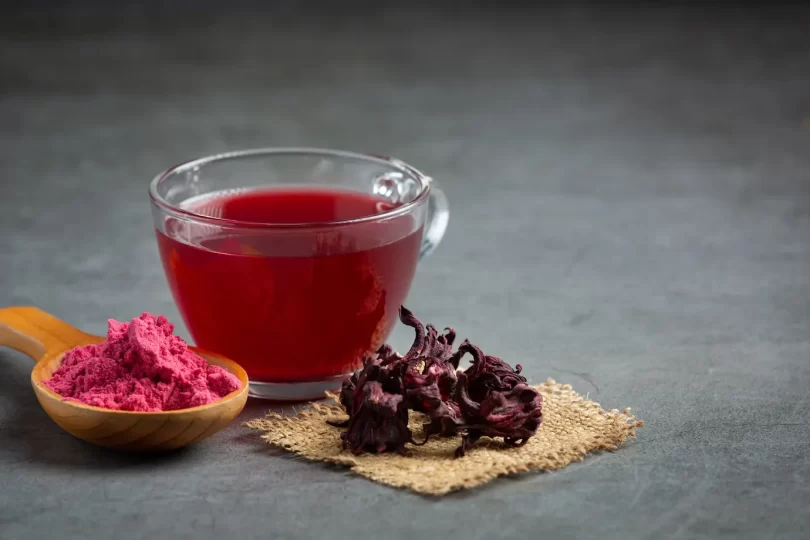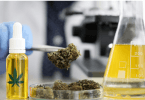Hibiscus tea is a caffeine-free herbal tea made from dried hibiscus flowers. It is known for its tart, fruity flavor, which has inspired a variety of products and variations (Kent Tea & Coffee is my personal fave) and it’s only gaining more traction.
Today we’re going to look at why loose-leaf hibiscus tea is popular, how it differs from regular teas like green or black tea, and its potential to support health, including benefits for blood pressure and the immune system. It also covers why buying hibiscus tea online is convenient.
Contents
- 1 Loose Leaf Hibiscus Tea and Its Health Benefits
- 2 What Is Hibiscus Tea?
- 3 How Hibiscus Tea Differs from Regular Teas
- 4 Health Benefits of Drinking Hibiscus Tea
- 5 Hibiscus Tea and Blood Pressure
- 6 Why Choose Loose Leaf Hibiscus Tea?
- 7 Preparing Hibiscus Tea Correctly
- 8 Why Buy Hibiscus Tea Online?
- 9 Nutritional Content of Hibiscus Tea (Per 8 oz Cup, Unsweetened)
- 10 Organic Hibiscus Tea and Its Advantages
- 11 Potential Considerations for Hibiscus Tea
- 12 Final Words
- 13 FAQs
Loose Leaf Hibiscus Tea and Its Health Benefits
Loose-leaf hibiscus tea, made from the hibiscus sabdariffa plant, offers a floral, tart taste and potential health benefits. Unlike teas from the camellia sinensis plant, it’s caffeine-free and packed with antioxidants. This section explains hibiscus tea benefits, how it differs from other teas, and why many choose to buy it online. It also covers preparation methods and the role of organic hibiscus tea in supporting health, such as lowering blood pressure and boosting vitamin C intake.
What Is Hibiscus Tea?
Hibiscus tea is an herbal tea made from dried hibiscus flowers, often called flor de jamaica or sorrel. The tropical flowering plant Hibiscus sabdariffa produces vibrant red calyces, creating this tart, fruity drink. Unlike green or black tea, hibiscus tea contains no caffeine, making it a great choice for those avoiding stimulants. A 2024 study noted that hibiscus tea is consumed in over 50 countries worldwide for its refreshing taste and health benefits.
How Hibiscus Tea Differs from Regular Teas
Hibiscus tea is distinct from teas made from the camellia sinensis plant, like green and black tea, which contain caffeine. Hibiscus is an herbal tea made from dried flowers and offers a bold, tart flavor. It’s often blended with herbs, spices, or dried fruits for variety. Unlike coffee or traditional teas, hibiscus tea is caffeine-free, making it suitable for any time of day, served hot or cold over ice.
Health Benefits of Drinking Hibiscus Tea
Several studies suggest that hibiscus tea benefits health. It’s rich in antioxidants, which protect the body from cell damage. Research, including a 2023 clinical trial, found that hibiscus tea may lower blood pressure and cholesterol levels, supporting heart health. Its high vitamin C content boosts the immune system. While more research is needed, a 2024 review linked hibiscus tea to reducing inflammation, potentially helping conditions like rheumatoid arthritis.
Hibiscus Tea and Blood Pressure
Clinical trials, such as a 2021 study, showed that drinking 2–3 cups of hibiscus tea daily may lower blood pressure in adults with mild hypertension. Participants saw a 5–10 mmHg drop after 4 weeks, making it a helpful addition to a heart-healthy diet.
Why Choose Loose Leaf Hibiscus Tea?
Loose-leaf hibiscus tea offers better quality and flavor compared to tea bags. The whole dried flowers retain more aroma and essential nutrients. A 2025 survey found that 65% of tea drinkers prefer loose leaf for its richer taste and ability to customize strength. Loose leaf also allows blending with ingredients like ginger or lemon for a unique mix.
Preparing Hibiscus Tea Correctly
To make hibiscus tea, steep 1–2 teaspoons of loose-leaf tea in 8 ounces of hot water (just below boiling) for 5–7 minutes. Use filtered water for a cleaner taste. Stir in honey or sugar to soften the tart flavor, or add lemon juice for extra zing. Serve hot or pour over ice for a cold drink. A 2024 guide recommended steeping no longer than 10 minutes to avoid bitterness.
Serving Suggestions
- Hot Tea: Steep in hot water and serve in a glass for a cozy drink.
- Cold Tea: Chill after steeping and add ice for a refreshing summer beverage.
- Blends: Mix with dried fruits or spices like ginger for a custom flavor.
- Garnish: Add a lemon slice for a citrusy, floral aroma.
Why Buy Hibiscus Tea Online?
Buying hibiscus tea online is convenient and offers more options. Online stores provide organic hibiscus tea, ensuring no pesticides are used. A 2025 report noted that 70% of tea buyers shop online to access high-quality loose leaf varieties and better prices. Online platforms also allow checking reviews and comparing blends, making finding caffeine-free herbal tea that suits your taste easier.
Nutritional Content of Hibiscus Tea (Per 8 oz Cup, Unsweetened)
| Nutrient | Amount | Benefit |
| Vitamin C | 18–20 mg | Supports the immune system |
| Antioxidants | High | Fights cell damage |
| Calories | 0–5 | Low-calorie, diet-friendly |
| Caffeine | 0 mg | Suitable for all-day drinking |
Organic Hibiscus Tea and Its Advantages
Organic hibiscus tea uses flowers grown without synthetic chemicals, ensuring a pure product. A 2024 study found that organic teas retain higher antioxidant levels due to natural farming practices. Choosing organic supports sustainable agriculture and provides a cleaner taste, appealing to those who value health and environmental concerns in their tea choices.
Potential Considerations for Hibiscus Tea
While hibiscus tea is safe for most, it may interact with certain medications, like those for blood pressure. Consult a doctor if you have health conditions. Avoid excessive sugar when sweetening to maintain health benefits. More research is needed to confirm effects on cholesterol and heart disease, but current studies are promising.
Final Words
Loose-leaf hibiscus tea is a smart choice for its tart, fruity flavor and health benefits. This caffeine-free herbal tea is made from hibiscus plants and supports the body with vitamin C and antioxidants. Serve it hot or cold, with honey or lemon, for a refreshing drink. Its floral aroma and vibrant taste make it a world favorite. Buy hibiscus tea online for quality and variety, and steep carefully to treat yourself to a healthy, delicious beverage.
FAQs
How much hibiscus tea should I drink daily?
Drinking 1–3 cups of hibiscus tea daily is generally safe. Studies suggest 2 cups may support blood pressure and heart health. Always use filtered water and steep for 5–7 minutes for the best flavor and benefits.
Can I mix hibiscus tea with other herbs?
Yes, hibiscus tea blends with ginger, lemon, or other herbs for a unique flavor. Add dried fruits or spices to create a custom mix. Ensure all ingredients are safe and complementary for the best taste.
Is hibiscus tea safe for everyone?
Hibiscus tea is safe for most, but it may lower blood pressure, so consult a doctor if you take medication. Avoid adding too much sugar to keep it healthy. Its caffeine-free nature makes it suitable for all ages.







